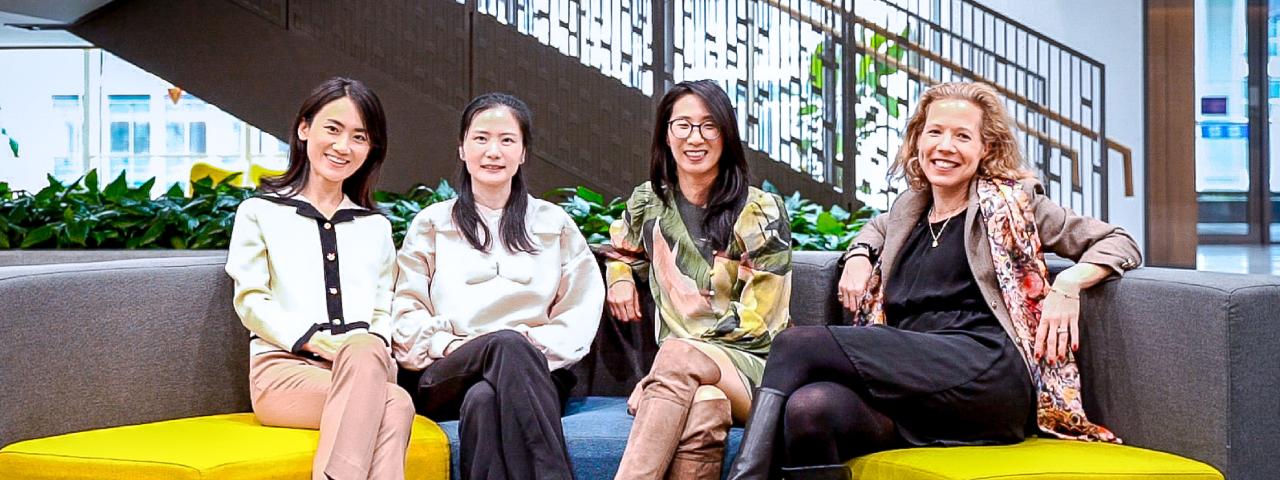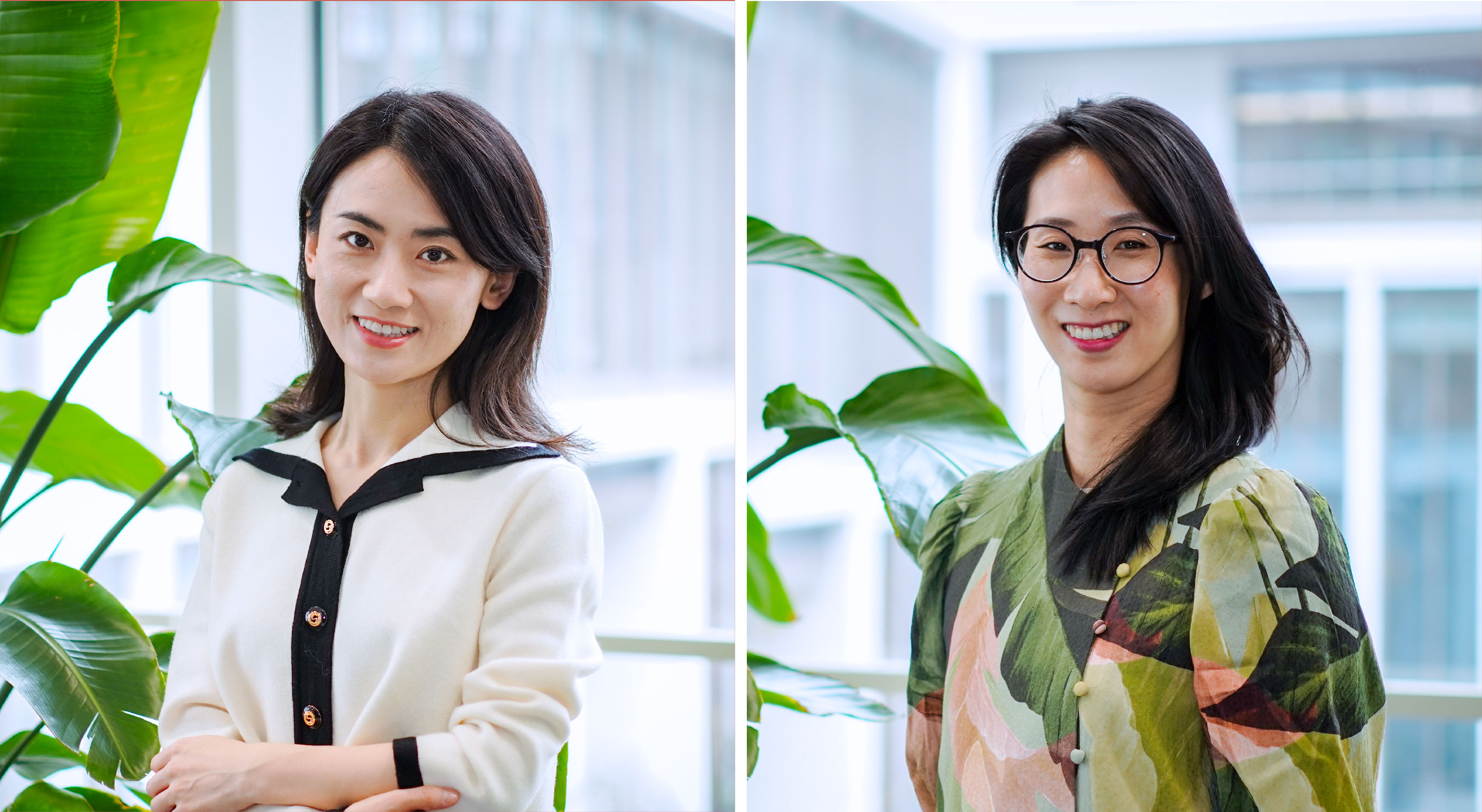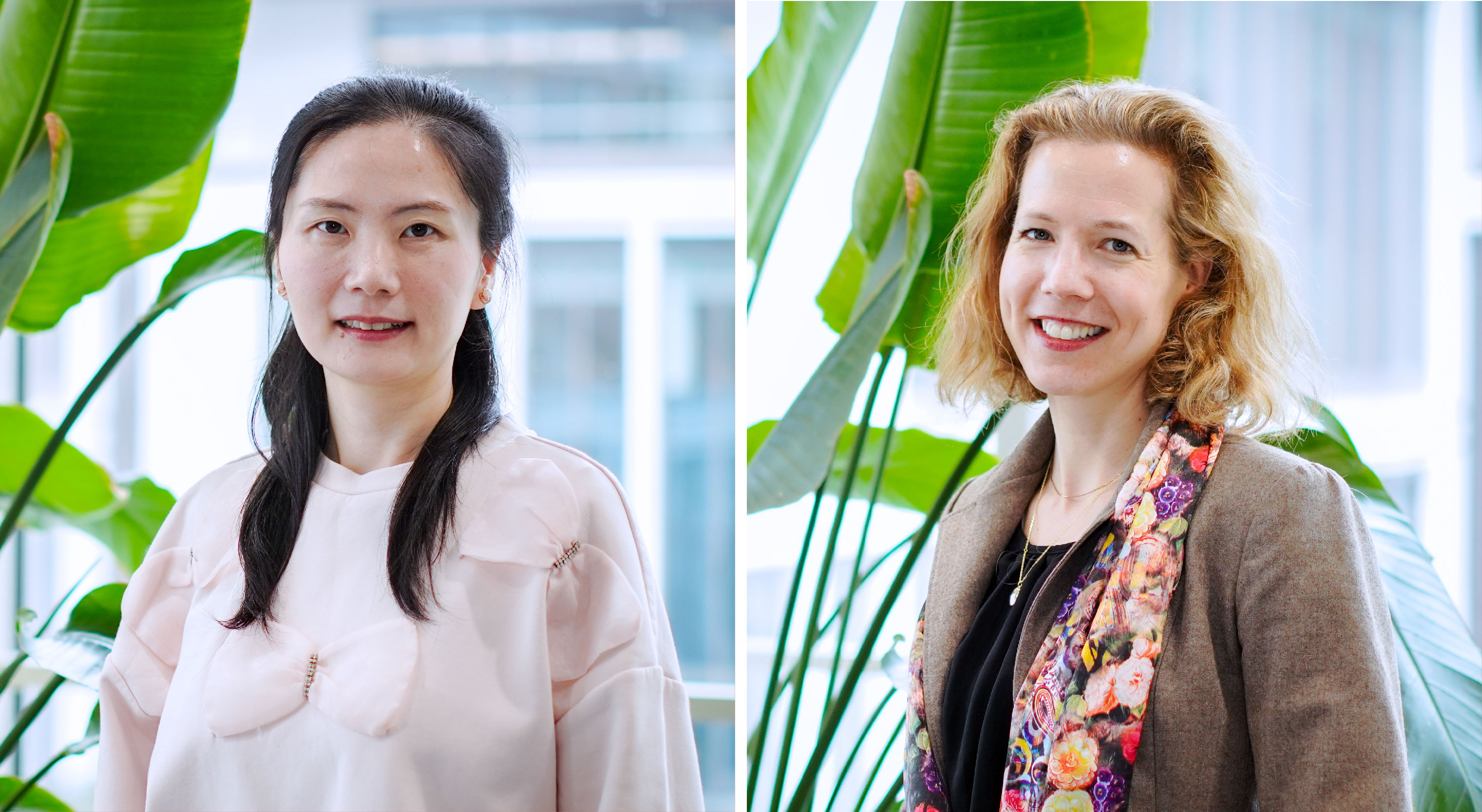
Women make up about 40% of NYU Shanghai’s faculty, and their contributions have shaped the development of NYU Shanghai’s community over the past decade. We spoke to four female academics at NYU Shanghai in a variety of fields to learn more about their experiences and perspectives on gender in academia.
Visiting Associate Professor of Psychology and Head of Social Sciences Katie Aafjes-van Doorn received her PhD in clinical psychology from the University of Oxford.
Assistant Professor of History and Global Distinguished Assistant Professor at NYU Heather Ruth Lee received her PhD from Brown University. Before joining NYU Shanghai, she served as a Mellon Postdoctoral Fellow in the Humanities at MIT.
Assistant Professor of Management and Organizations Tanya Yuan Tian received her PhD from the Kellogg School of Management at Northwestern University.
Assistant Professor of Philosophy Yuan Yuan received her PhD in philosophy from Yale University. Before joining NYU Shanghai, she served as an assistant professor of philosophy at Virginia Commonwealth University.

What is the gender balance in your field?
Yuan Yuan: When I was studying for my PhD at Yale, there were only three females among the 30 professors in the department. When I was studying for my master's degree at Peking University, there were even fewer. Compared with the male teachers who took the spotlight, there was a huge gap in influence. But in recent years, I’ve observed more attention paid to female scholars in different academic settings than before.
Heather Ruth Lee: [At NYU Shanghai] we are the majority [in the humanities]. That doesn't represent the field of history though, which is majority male. It's not necessarily a very racially diverse field either. I identify as a woman of color, and it’s important for me to acknowledge the way race and gender intersect to create different outcomes. It’s very different if you are a white female, for example, versus a woman of color historian. To separate out gender as something that exists in isolation doesn’t map onto the lived realities of people. White people have a race and that accrues important benefits, as much as people of color are penalized in particular ways. I want that to be seen in this conversation on the specificities of gender.
Tanya Yuan Tian: I study diversity and science. Research and data in this area show that women are a minority in most academic fields. However, in recent years, the participation rate of women in science (as measured by publications) has been rising rapidly especially in some fields such as medicine and psychology, where the participation rate of women is close to 50 percent. However, there are significant field variations, and career age differences where women tend to be earlier in the career cycle.
Katie Aafjes-van Doorn: As a psychologist, it's mostly female. In academia, I think it's more balanced between male and female.

Left: Assistant Professor of Management and Organizations Tanya Yuan Tian Right: Assistant Professor of History and Global Distinguished Assistant Professor at NYU Heather Ruth Lee
From your observations and experience, what are the specific challenges facing female academics?
Katie Aafjes-van Doorn: I don't see myself as a female scholar. I'm just someone in academia. I don't necessarily see unique challenges, whether I'm male or female. I think it's a perfect career path if you're intellectually curious and enjoy the freedom of delving into topics. I feel it's a luxury to be a "forever student" and actually make that my job. I know it's not as lucrative as some other careers, so unique challenges would be mainly financial--but I guess that's for males too.
Yuan Yuan: Female scholars need to make extra efforts to prove themselves. You have to do much better than men before others think you are worthy of respect. Students may have gender bias against female professors and may show more respect for male professors. I felt this when I taught in the US. Once a friend told me that when she was a teaching assistant in a logic class, students would bypass her and go to the male assistant for assistance, even though she was just as qualified, perhaps even more so.
Another issue is gaining support from our academic advisors. Students can really benefit from professors and mentors who are willing to spend time and energy to help them. Since there are very few women in the generation ahead of me, we female scholars may get less support from our academic mentors than our male peers — as male bonding is prevalent in the academic ecosystem as well.
Tanya Yuan Tian: Many institutions seek to encourage women’s participation in science. But gender inequality persists, often due to various subtle and unintended mechanisms. For example, research shows that women may receive less credit than men for their contributions. This subtle mechanism of gender inequality has significant implications both for women’s career and science as an institution. While my research documents that gender diverse teams produce more novel and higher impact works, concerns that arise from this mechanism may contribute to the under-representation of mixed-gender research teams.
Heather Ruth Lee: Certain kinds of knowledge and expertise are gendered and racialized in the sense that following a faculty track is a privileged pursuit and that privilege is generally reserved for or reflective of the racial hierarchy of society at large. Certain academic subjects and disciplines get coded as “male” or “female,” which then affects research tracks people follow. Those gender patterns are also reflected in salaries, too. It's no secret that male faculty still make more than female faculty. It's still a gap that institutions across the board are struggling with. Some are more actively trying to narrow that gap, but there's just certain subjects that are gendered and to make your way into them, you need to have a network. It's really hard to build those networks when there are no women in place.

Assistant Professor of Philosophy Yuan Yuan Right: Visiting Associate Professor of Psychology and Head of Social Sciences Katie Aafjes-van Doorn
Is there a glass ceiling for female academics?
Yuan Yuan: The statistics show that female presence decreases as the academic rank arises, i.e., from graduate students to assistant professors to associate professors to professors. It’s a bit like a ceiling. It’s not that you can’t break through, but it’s more difficult. It is easier for the male academics to move up the ranks.
Gender also affects the influence of your research, that is, whether your work is cited and discussed by fellow scholars. In this aspect, women are far behind male scholars. It requires systematic efforts to break through. I have also seen some very successful female scholars exerting their influence, which is inspiring.
Katie Aafjes-van Doorn: I don't really see a glass ceiling. In the field of psychotherapy, some of the most renowned psychotherapy researchers are female. What I have observed is that women tend to be their own worst enemy. It's more about confidence. I see female colleagues applying for jobs who say, “but I'm not perfect in this or I'm not perfect in that,” and male [colleagues who] are more confident and say, “well, I can learn this, so I'll say that I can do it.” So I think it's more about confidence than that there's a real ceiling based on external factors.
Where do you see female researchers really excelling?
Yuan Yuan: Having grown up in patriarchal systems, we are often more sensitive to certain issues. We can more easily empathize with the oppressed groups and appreciate their insights. For example, when I study just war theory, I can sometimes identify issues that are not easy for male academics to see. But it’s not because women are inherently more sensitive, it’s because there’s a difference in the way we were raised. Having different lived experiences than men can offer women a unique perspective from which to produce knowledge.
Katie Aafjes-van Doorn: My original plan was to be a clinician, and that would [have meant] seeing patients regularly and be mentally available all the time. No matter if I’m male or female, I think the advantage of an academic career is the flexibility of it. We are all internally motivated enough to work hard, but can do so during the hours that we are most productive. That's just been amazing. I feel in that sense, quality of life and especially the combination of work and family life really works well, but again that should be the same for male colleagues.
Which female academics have had an influence on you?
Heather Ruth Lee: Maria Montoya was a wonderful mentor. She could meet you on the professional level, but she could also meet you on the social level. I’m inspired by Joanna Waley-Cohen’s willingness to put herself out there, to be available. I think it’s an important step for more junior members of the community to feel like there is somebody that they can approach.
Yuan Yuan: One of the great inspirations to me is Anna Stilz, a scholar who teaches at Princeton University, and another is Iris Young. During my PhD studies at Yale, one of my professors, Sun-Joo Shin, gave me a lot of help and practical guidance during the most difficult time of my PhD studies.
Katie Aafjes-van Doorn: During my doctoral degree in Oxford, there was a director of the training Professor Sue Lewellyn and she was a female role model [for me]. She had a family, but she was a very accomplished researcher, and so she did it all. And I think that was really helpful to see. Especially because my mother didn’t work outside the home once I was born, so I never knew what that would look like--having a family and work, where you could do both. During my masters at Oxford, my research mentor, Freda Mcmanus-- she had two young kids while she was mentoring me, and I remember that I sent her drafts on Friday, and she was reviewing it on Saturday, while she was with the kids at soccer practice, still responding. So I got the sense, it is possible to do it all.
Tanya Yuan Tian: Recently, my mentor’s wife has been a great inspiration to me. Her strength and love in the face of massive challenges empowered me to persevere no matter what.
What advice would you give to young female students who want to follow your path and pursue a career in academia?
Heather Ruth Lee: I think it's important to me to train women who are interested in history, partially because I think in any profession, mentorship is really vital to opening up pathways. I think if there's fewer female faculty who are historians, there are fewer female faculty offering mentorship. So I think that there's a kind of responsibility that we have to open up doors. And I do this with caution. I don't want people to enter the field of history thinking that there are an abundance of jobs. I think that there is a real structural problem there, but I think that mentorship and sort of building multi-generational mentorship networks is vital if you want to see women grow in ranks of certain fields.
Yuan Yuan: My undergraduate major is international economics and trade, but my passion is philosophy. When I decided to take the postgraduate entrance examination in philosophy, many people did not understand, but I knew that if I didn’t go that route, I would feel my life was in vain. Therefore, my advice is to think about what kind of life you want to live. If you are willing to take risks, then follow your heart and go step by step. Don't limit yourself. At the same time, find the people who believe in you and can support you.
Tian Yuan: I think academic research involves massive uncertainties. For example, the publication cycle may take years, and it is unclear whether one idea will take off when you start investing in it. Learning to embrace uncertainties is important. I think having passion for your research helps. Discipline helps. Perseverance helps. This is a marathon.
What’s the best piece of advice you’ve received?
Katie Aafjes-van Doorn: Choose collaborators you enjoy working with. So it's not so much about the perfect area of expertise or topic of research, but actually, the team that you work with. It can give a tremendous sense of energy if you work with people who inspire you and you enjoy brainstorming with. Some other collaborations have drained more energy out of me. So I think the people part is more important than I had anticipated.
Tian Yuan: There is no shortcut in life. Hard work matters. Perseverance matters.
Yuan Yuan: I can’t really think of one, but that may have more to do with my personality. Ever since I was a child, I have made important decisions by myself, and I generally don’t listen to other people’s advice.
If you could go back 20 years, what would you tell your younger self?
Tanya Yuan Tian: Be brave. It takes a lot of courage to be yourself and to do the right things when we are faced with challenges in life.
Heather Ruth Lee: There's a way in which trusting my instinct has really paid off, but there's also a way in which I didn't know how to enter male-dominated spaces. For example, in high school, that was the physics classroom, which was taught by a man and all the students were male. In college, I also didn't know how to enter an economics classroom. And I never was interested in entering the field of business. I'm really in awe of the women who do. I think that there's a way in which I didn't have the social resilience to try to take those kinds of risks. But had I developed those earlier, I would have told a younger me to be more confident to take those chances.
Katie Aafjes-van Doorn: Learning is really for yourself. It's not for a degree or for a professor, or for a good grade. This is such a luxury to be able to study, learn and absorb.
Yuan Yuan: Be yourself.
Want more? Meet seven NYU Shanghai women who shared about working and studying in the STEM fields.

